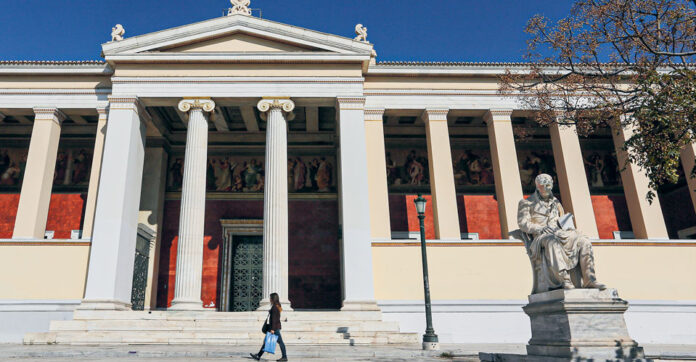By Evi Chrysoheri,
In the modern world the majority of high school students after their graduation they continue to expand their education by choosing to attend the University of their liking. Similarly, a significant amount of Greek high schoolers follow this path, but what do they face when they enter after all the hard work they put so they can pass to the public university of their preference? It is well known that the public universities in Greece are placed highly in the category of the best universities around the world for the great curriculum they have to offer which leads to the great scientists they produce.

However, as good as the education program those universities have to offer is, they are lacing in other aspects like the facilities, due to low funding from the government and most likely the bad management of the given fund. But here I’m going to analyze another problem as I see it, of the great partisanship university students have come to. The Student Association is partly interested in the struggles students face and is more invested in the indirect promotion of the dominant party. It only takes a walk inside any public university of Greece in which you will see posters with political slogans or huge banners and even graffiti on the walls of such kind, all under the signature of campus clubs. The truth is that only a small group of people are members of the Student Association out of the thousands registered student in the university so it’s easy for parties to exercise their influence. Now by any means, I don’t claim that being informed about political issues, having your own opinion, beliefs and expressing them is a bad thing, quite opposite, but student clubs aren’t formed for this kind of purpose.
Additionally, I believe this is the reason why students avoid participating and becoming a member of the Association; even the number of voters in the student election is so small compared to the assembly, that’s how much partisanship has affected the student community. For example, in the Student’s Association meetings which are held so issues that worry college students can be solved and discussed between the members and attendees, isn’t exactly as someone would picture it. More detailed, the high ranked members of the association start by saying the issue that will be mentioned in the particular meeting and then other participants can express their own perspective. The problem is that the members represent the party of their liking and so, this leads to arguments betwixt attendees from different parties. The disagreements can become so heated that the freedom of speech can be deprived and even violence can be used so in the end a vote is taken and the party with the more members imposes its decision about a certain topic. Therefore, all the actions promoted by the Student Union to engage students in improving their academic community and defending their rights almost always entail the simultaneous promotion of the political party they support.
Ultimately, it is sad how democracy is tarnished especially in its generator country and amongst young people which they are considered the new generation this fact makes us realize how deeply the existing system has affected the youth. There are many more examples that can be mentioned which demonstrate that the phenomenon of the political polarization existing within the student community. Fortunately, this problem is not insurmountable, and with the collective and active effort of other students, it will be addressed. Thus, the voice of students will be free from political intrigues and interests and it will be taken more seriously by the society and as tool of parties.




